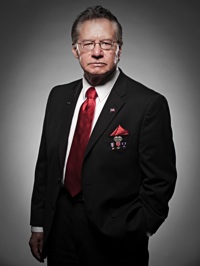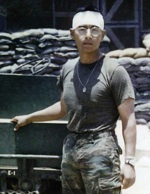 George Banda
George Banda
Medical Specialist 4
2nd Battalion, 501st Infantry,
101st Airborne Division
December 1969-November 1970
Firebase Henderson in Quang Tri was not a good place to be. The jungle was right there. Anybody could sneak up real quick, and you wouldn’t see them until it was too late. We had 15 of the recon platoon there, attached to Echo Company, 2nd Battalion, 501st Infantry, 101st Airborne Division, as well as Alpha Company, some ARVN and artillery. This was a temporary base. We were just coming in, giving support and then we’re gonna go. I was thinking, “OK, tomorrow morning we’ll get up early and start making it more secure.”
I did that night’s last watch, and the next morning, May 6, 1970, I was sitting by the foxhole at 5 when there was an explosion on the west side of the hill. Seconds later a trip flare goes off 50 feet in front of me. I hit the claymore positioned in that area, and it blows. I yelled: “Hey, you guys better wake up. Something’s happening.” An instant later, an RPG hit five feet away. I went flying up in the air, landed on my head.
I looked at myself, “OK, I’m not hurt. I’m not bleeding.” I started shooting, mostly at shadows, until I ran out of ammunition. There was a box of hand grenades, and I tore it open. The other guys came around. One had half of his left foot blown off. My first-aid bag was blown to smithereens, so I took off my shirt and wrapped it around his foot. We were shooting down the hill, throwing frags, rocks—whatever we could find. Bullets were hitting near us.
One of the guys turned around, and there was a gook. Dave Matison shot him, and he fell right into an ammo dump, which started exploding, showering us with shrapnel. White phosphorus started falling on us, but we still stayed in that foxhole. Finally I said, “We can’t stay here, we’re gonna get killed.” We went around the hill to where the others were, Ed Veser, Ken Schutte, Doc Diller, Doc Bowman, Lieutenant Hawley, Sergeant Snyder. It’s chaos. Everybody’s screaming.
At some point, I had caught a round on the left side of my head. Every time I moved, I would squirt five feet of blood. Being a medic, knowing an artery had been severed, I knew I was bleeding to death. Finally, it slowed down a little and I thought: “OK, I can handle this. Start taking care of these guys.”
Schutte had been shot, and I think he had lost one eye, but he was still throwing hand grenades. Diller was just laying there on his back like he was asleep. I tried to pick him up and saw the back of his head was gone. I went over to Hawley. Dead. Snyder was dead. Then I thought, “Where the hell is Ed?” And I’m not sure how Ed Veser got down there, but there he was, leaned over in a pile of debris maybe 100 feet down the hill.
But I hesitated to go down there. I wanted to stay where I was. “I’m bleeding to death,” I thought, “and Ed’s way down there. If I go down there, I’m gonna get killed. What good can I do?” But I couldn’t leave Ed down there—he was my friend.
I ripped off a piece of my T-shirt, rolled it into a ball and pushed it into the hole in my head until it hurt. I tied the rest of the shirt around my head, then crawled down the hill. Ed was in an open area, with nothing bigger than a small rock for protection.
I got to him, and the thing I’ll always remember is, he said to me, “I knew you’d come.” I still feel guilty about that. He was horribly wounded…should’ve been killed instantly. But he was strong, young. “Ed, if you help, we can get you back up there.” But he couldn’t help, he was injured too bad.
 To this day I don’t know how I dragged him up to the hill, but I got him to the sandbags and laid him down. “The helicopters will be coming,” I told him. “We’ll get you out of here.” He could still speak, which is unbelievable, and he grabbed a hold of my dog tag real tight and said: “OK, OK. Don’t leave me.” And I said, “I won’t Ed.”
To this day I don’t know how I dragged him up to the hill, but I got him to the sandbags and laid him down. “The helicopters will be coming,” I told him. “We’ll get you out of here.” He could still speak, which is unbelievable, and he grabbed a hold of my dog tag real tight and said: “OK, OK. Don’t leave me.” And I said, “I won’t Ed.”
But after a while I said: “Ed, I gotta go check on the other guys. They’re hurt too.” He said, “No, I don’t want you to go.”
I said, “Ed, I don’t want to go, but I got to.” I started pulling away, and he pulled one of my dog tags out. So he held onto that. “Ed, I’ll be right back,” I said as I went to check on Schutte and the others.
They seemed to be all right, so I turned to go back. That’s when an Alpha Company team came to rescue us. The first guy who saw my wounds, his eyes got real big and he said, “Are you all right?” I said, “Yeah, I’m all right.” I kept talking to Ed, trying to keep him conscious. “Hey your wife is waiting back there for you, Ed. Just hang in there. The medevacs will be here soon.” But the ammo dump was exploding, and we were still taking a lot of fire, so the medevacs couldn’t land. It was real frustrating because, you know, Ed’s dying on me.
Finally, the medevacs landed and loaded Ed aboard. I thought, well, maybe they might be able to save him. I did another walk around to make sure I hadn’t missed anybody. But everybody was dead; 32 Americans killed that morning. I jumped on the last helicopter and ended up in a Marine hospital for two weeks. In the chaos, I was reported missing in action. Ed didn’t make it. He died at 7:40 a.m. But, that’s war. We were both from Milwaukee, and at the cemetery where he’s buried, I’ll still go visit him.
From the documentary Wisconsin Vietnam War Stories, by Wisconsin Public Television,
www.wisconsinstories.org/vietnam.




